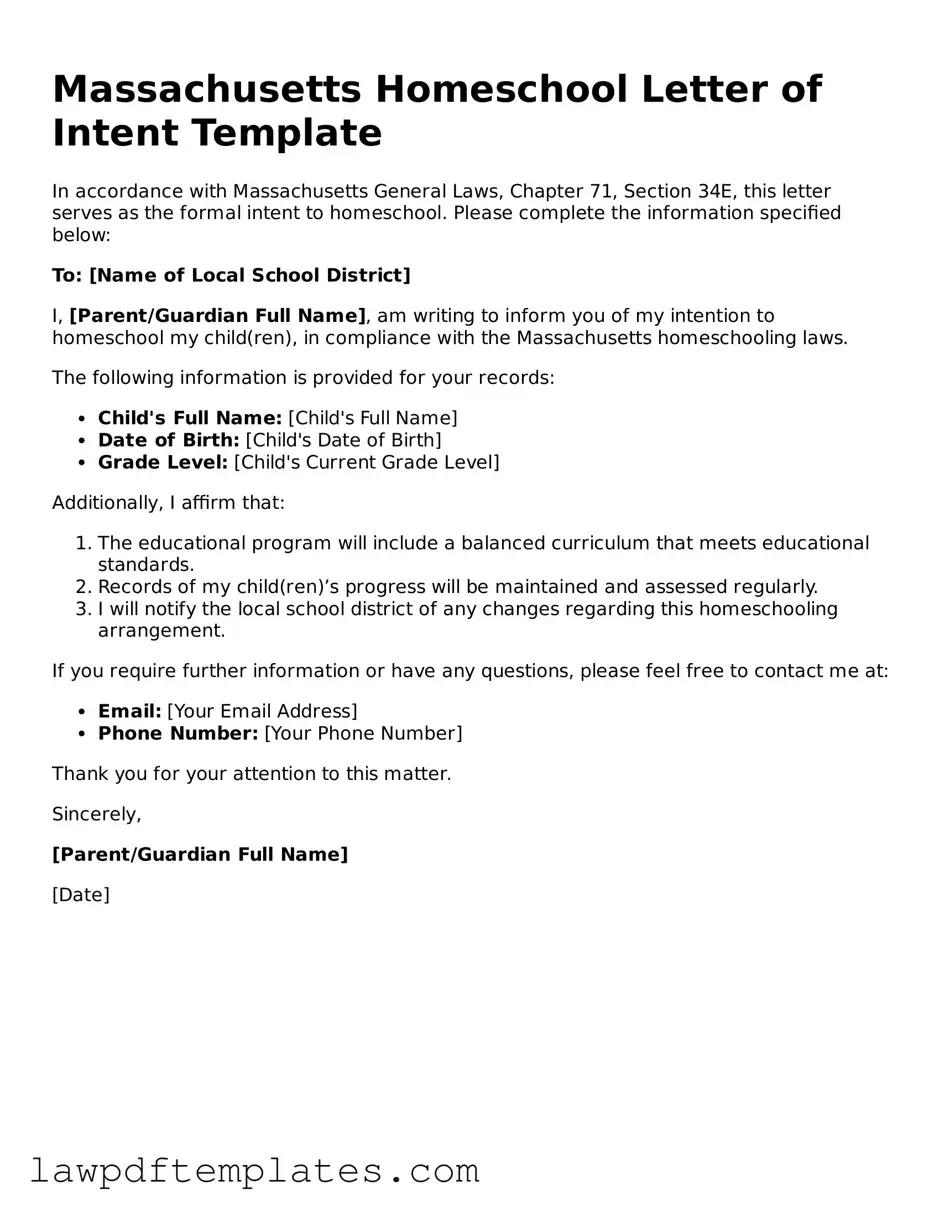Free Homeschool Letter of Intent Template for the State of Massachusetts
Form Breakdown
| Fact Name | Description |
|---|---|
| Governing Law | The Massachusetts Homeschool Letter of Intent is governed by Massachusetts General Laws, Chapter 76, Section 1. |
| Purpose | The form serves as a notification to the local school district of a parent's intent to homeschool their child. |
| Submission Deadline | Parents must submit the Letter of Intent at least 14 days before the start of the homeschooling program. |
| Required Information | The form typically requires the child's name, age, and the educational plan to be followed. |
| Annual Review | Parents must provide an annual assessment of the child's progress to the local school district. |
| Local School District | The Letter of Intent must be submitted to the school district where the child resides. |
| Multiple Children | If homeschooling multiple children, a separate Letter of Intent is required for each child. |
| Approval Process | There is no formal approval process; however, the school district may request additional information. |
| Record Keeping | Parents are advised to keep a copy of the Letter of Intent for their records. |
Sample - Massachusetts Homeschool Letter of Intent Form
Massachusetts Homeschool Letter of Intent Template
In accordance with Massachusetts General Laws, Chapter 71, Section 34E, this letter serves as the formal intent to homeschool. Please complete the information specified below:
To: [Name of Local School District]
I, [Parent/Guardian Full Name], am writing to inform you of my intention to homeschool my child(ren), in compliance with the Massachusetts homeschooling laws.
The following information is provided for your records:
- Child's Full Name: [Child's Full Name]
- Date of Birth: [Child's Date of Birth]
- Grade Level: [Child's Current Grade Level]
Additionally, I affirm that:
- The educational program will include a balanced curriculum that meets educational standards.
- Records of my child(ren)’s progress will be maintained and assessed regularly.
- I will notify the local school district of any changes regarding this homeschooling arrangement.
If you require further information or have any questions, please feel free to contact me at:
- Email: [Your Email Address]
- Phone Number: [Your Phone Number]
Thank you for your attention to this matter.
Sincerely,
[Parent/Guardian Full Name]
[Date]
Common mistakes
Filling out the Massachusetts Homeschool Letter of Intent form can seem straightforward, but many families make common mistakes that can lead to complications. One frequent error is failing to provide all required information. The form asks for specific details about the student and the educational plan. Omitting any of these details can delay the approval process.
Another mistake is not updating the form when circumstances change. If a family moves, changes their educational philosophy, or alters their curriculum, they must submit a new Letter of Intent. Ignoring these updates can result in misunderstandings with local school authorities.
Some parents overlook the importance of clarity in their educational plan. The form requires a description of the curriculum and learning objectives. Vague or overly broad descriptions can raise questions about the adequacy of the proposed education. Providing clear and specific information is crucial for a smooth approval process.
Another common issue is submitting the form late. Massachusetts law requires that the Letter of Intent be submitted at least 14 days before the start of the homeschooling period. Delays can lead to unnecessary stress and potential legal complications. Timeliness is essential.
Additionally, some families fail to keep a copy of the submitted form. This oversight can create confusion later if there are questions or disputes about the homeschooling arrangement. Keeping a record of all submitted documents is a best practice for any homeschooling family.
Many parents also underestimate the importance of communication with local school officials. Not reaching out to discuss the homeschooling plan can lead to misunderstandings. Open dialogue fosters a better relationship and ensures that everyone is on the same page.
Finally, some families neglect to review the Massachusetts homeschooling laws and guidelines. Understanding the legal requirements is vital for compliance. Ignorance of the law can lead to unintended violations, which could jeopardize a family's homeschooling status.
Discover More Homeschool Letter of Intent Templates for Specific States
Ohio Homeschool Assessment Form - This document may also outline the curriculum or educational approach you plan to take.
A Virginia Motor Vehicle Bill of Sale form is essential for documenting the sale and transfer of a vehicle, providing both parties with proof of ownership. By including important details about the vehicle and the transaction, this form helps avoid any ambiguities. To simplify the process and ensure a smooth transfer, you can access a well-prepared version of this form at PDF Documents Hub.
Homeschool New Jersey - Prioritizes your child's unique learning style and pace.
